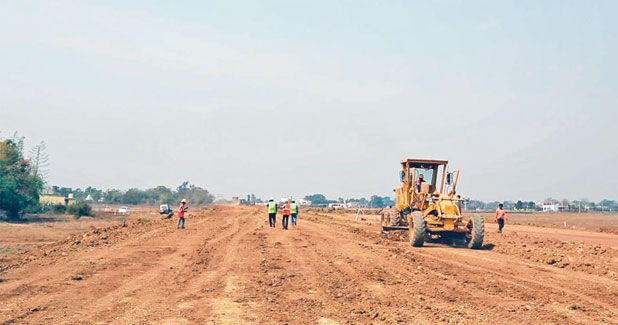
Trimble Technology Improves Productivity
Gayatri Projects Ltd is the flagship company of Gayatri Group that has interests in infrastructure, power, hospitality, real estate and industry. Established in 1963 as a partnership firm specialising in irrigation construction projects, it has now established itself as one of India?s leading infrastructure companies with expertise in construction and infrastructure assets.
Business challenge
Gayatri was hired for a highway road widening project in the state of Odisha, India. The 163 km (101 mile) stretch of road (NH215) was being widened from two lanes to four lanes. The Project was delayed due to land acquisition, forest diversion and environmental clearance from the government. The process for handover of land is still on. The National Highway road is considered to be the economic lifeline of the mineral- reach Keonjhar and Sundargarh district of Odisha State of India. To address the delay in the project, Gayatri turned to its technology partner SITECH? and Trimble for help.
Solution
Gayatri equipped its motor grader with Cat? AccuGrade? cross slope grade control.
Benefits
- Gayatri was able to stay on grade and improve productivity by 42 per cent compared to conventional methods.
- This includes 36 per cent fewer passes required and 44 per cent less machine run time
- cut fuel consumption by 47 per cent
- 100 per cent accuracy; met tolerance for grade of ?20-25 mm with fewer passes
Gayatri has a strong presence in the engineering, procurement and construction of road, irrigation and industrial projects across India. In fact, over the last 50 years, the company has repaired and built 5,094 km of roads and 1,200 km of irrigation canals. Its subsidiaries are also producing power and infrastructure projects that will generate over 5,000 MW of power.
In 2013, Gayatri was selected by the National Highways Authority of India (NHAI) for the widening of the Panikoili to Rimuli section of the NH215 highway. This highway is considered an economic lifeline of the mineral-rich area. In addition to widening the road from two-lanes to four, the project requires building facilities including flyovers, underpasses, bridges, bus bays, rest areas and service roads. The project will also include highway traffic management systems, highway patrolling service and accident vehicle recovery service. Scheduled to be complete in 2016, this project was broken into two phases: Panikoili to Rimuli, which is 163 km, and Rimuli to Rajamunda, which is 106 km.
Project Manager Venkat Reddy consulted with Gayatri?s technology partner SITECH India North & East and adopted the Cat AccuGrade 2D Cross Slope system for its motor grader. The system uses sensors on the machine to control the slope of the blade during operation.
In order to widen the road, the Gayatri team had to lay each layer of material precisely, starting with the sub-base course, base course and finally the surface courses. To prepare the sub-base course, Gayatri conditioned the soil, mixed material and loosened up the hard layer of material so subsequent material can bind properly. There was a 250 mm layer of soil and the next layer was embankment top layer at 70 mm in thickness. Five full time surveyors surveyed the NH215 site initially.
Traditionally, road building projects require this initial survey plus ongoing subsequent grade checking of the project site. Not only is surveying, running and re-setting stakes costly, it is time consuming and means the motor grader is often running but not being utilised. This burns fuel and adds wasted time to the project.
With the grade control system, only the first pass requires a grade stake and checker. The rest of the passes reference the first pass, using auto mode. The machine-mounted sensors calculate necessary blade position to achieve the desired cross slope of the sub-base course and surface layers.
?With the sensor, we are getting accurate tolerance limits ?10 mm, and because of that we require less man power,? said Nagraj Chowdary, Senior Civil Engineer for Gayatri. ?Once the peg marking is done, it runs automatically by auto sensors of hydraulic systems so no manpower is required later, which means we can utilise that manpower somewhere else.?
Overall, Gayatri was able to stay on grade and improve productivity and accuracy by 42 per cent compared to conventional methods. Further, they were able to increase accuracy and decrease both fuel consumption and grading time, while building a better road that is expected to have a longer life and overall lower long-term maintenance costs. With less rework, Gayatri saved costs on the final embankment layer material. Fuel consumption for that same embankment layer went from 19 litre (5 gallons) to 10 litre (2.6 gallons), which is a 47 per cent increase in fuel efficiency.
The team also used the motor grader to cut and maintain the road ditch slope when building the road drainage systems. This was needed to remove material from the bottom of the ditch. With a slope of 2.5 per cent, the operator can create a crown by depositing the ditched material. By reversing the cross slope, the operator can move the material across the crown and down toward the other ditch if needed.
?In the first year of having the grade control system we have seen significant benefits in time savings, fuel savings and reduced wear and tear on our equipment,? said Reddy. ?At the same time, we have been able to build a smoother, better road that will require less long-term maintenance. This technology has been a very wise investment for our company, and one we will definitely be using whenever we can in the future.?
- Nagraj Chowdary, Senior Civil Engineer, Gayatri Projects ?This technology has been a very wise investment for our company, and one we will definitely be using whenever we can in the future.?


 +91-22-24193000
+91-22-24193000 Subscriber@ASAPPinfoGlobal.com
Subscriber@ASAPPinfoGlobal.com